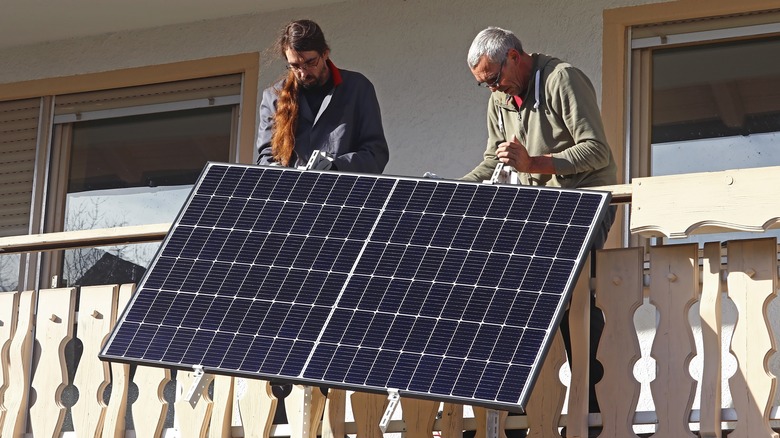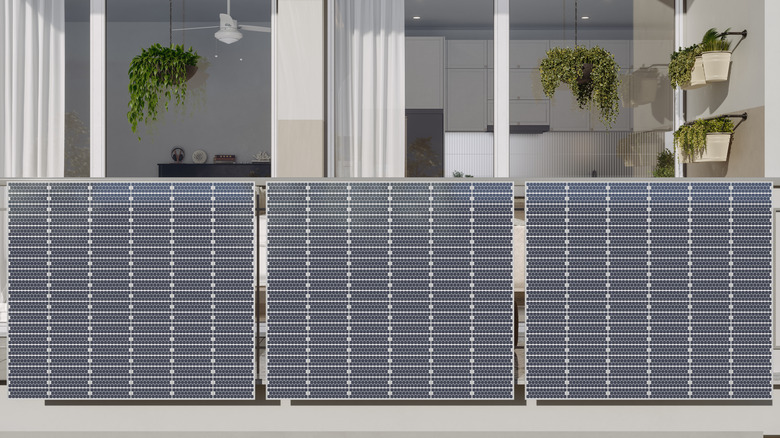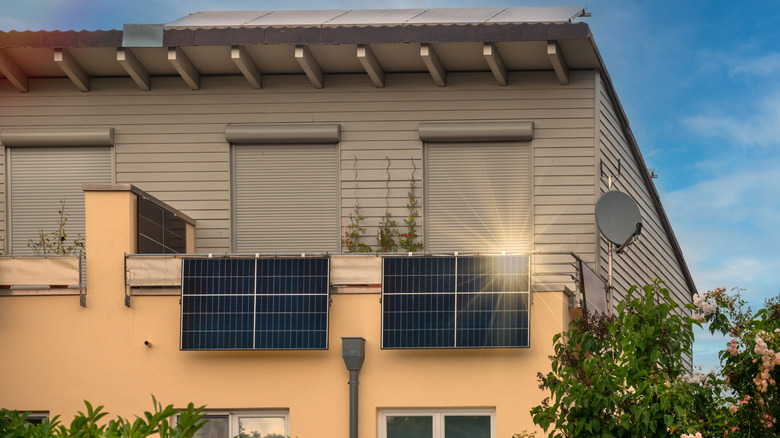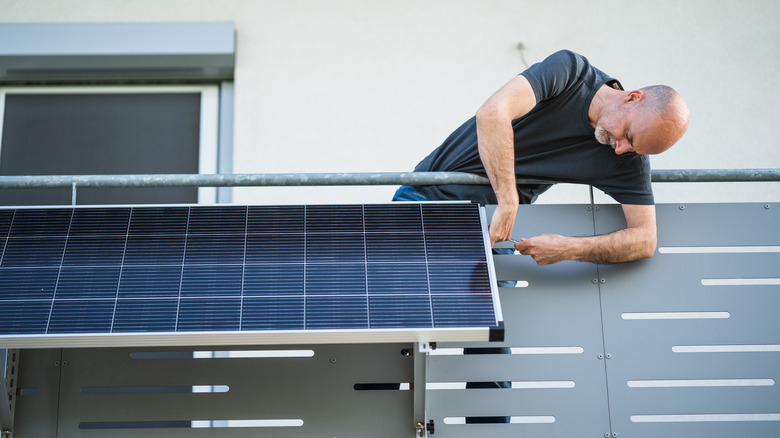Installing Solar Panels On Your Balcony: Is It A Good Idea?
When most people think of solar panels, they picture the massive arrays on rooftops or those spread across rural areas in solar farms. If you live in an apartment or condominium, you may even wonder if you can use solar panels to get in on the money-saving and green energy benefits of renewable energy. The answer is yes, thanks to portable, plug-in solar systems designed for use in smaller spaces like balconies and patios. They're already catching on in Europe, with Germany seeing the number of registered plug-in systems almost doubling since mid-2023; there are now a total of 400,000 balcony power plants throughout the country.
While there are questions about whether plug-in solar panels are any good, many people see them as useful contributions to countries' transition to using more renewable energy sources. Balcony solar panels aren't as popular in the U.S., but that's beginning to change as companies like Ecoflow and Anker have started promoting solutions for the American market. For those who live in urban areas with little space, balcony solar power might be an attractive option.
Can I put solar panels on a balcony?
While one of the most common myths about solar panels is that renters can't use them, the truth is that, yes, you can put solar panels on a balcony. However, you'll want to take a few things into consideration before doing so. You should start by checking local building codes and zoning laws, which vary greatly between cities and states. In most locations, you'll need a permit before installing solar panels, even on a balcony. Once you have all of that in order, you'll want to take a look at the amount of available space on your balcony because this will determine the size and number of panels you can install or whether it's even feasible. The more space you have, the more energy you can potentially generate.
Your balcony's orientation is also important in determining whether it makes sense to install solar panels. Solar panels should face south in the Northern Hemisphere to get maximum exposure to the sun. This ideal setup minimizes shade during the sunniest times of the day. East and west-facing balconies can still receive a good amount of sunlight, but it'll be less than the amount a south-facing balcony receives. If your balcony faces north, you won't receive enough sun exposure to make solar panels worth it.
If you've determined that your balcony is big enough and gets enough sunlight to install solar panels, you also need to consider whether it can support the weight of the panels and their mounting systems. Furthermore, before installation, you'll need your landlord or building management's approval. They should be able to help you determine whether your balcony is suitable.
How does a balcony solar system work?
The biggest difference between rooftop solar and balcony solar is the size. Balcony solar systems are much smaller due to space constraints and typically have one or two solar panels that plug into an electrical outlet. As a result, they produce much less energy than rooftop systems. You're not going to be able to power your entire home using a balcony solar setup. The balcony systems consist of solar panels, a solar inverter, optional battery storage, and whatever wiring is needed. They can either be mounted to balcony railings or placed on stands.
Balcony solar panels work in much the same way as rooftop panels — they capture sunlight and convert it into direct current (DC) electricity. From there, the solar inverter converts the DC electricity into alternating current (AC), the type of electricity used in homes. This process ensures the electricity the solar panels generate is compatible with your household appliances and the power grid. If you add a battery storage system, like EcoFlow's Delta Pro, you can store excess electricity generated during peak sunlight hours for use at night or on cloudy days.
One of the nice things about balcony solar panel systems is that installation can often be a DIY project. Most of them have a plug-and-play setup that doesn't require a lot of technical knowledge. Installation typically involves setting up the solar panels and connecting them to the inverter and optional battery storage.
Is installing solar panels on your balcony a good idea?
Although balcony solar panels won't generate enough electricity to power your entire household, they can be a good idea if you're looking to generate renewable energy while living in an apartment or a home without roof access. How effective they are will depend on how much sunlight your balcony gets. As mentioned above, if your balcony is north-facing, a balcony power plant isn't going to be a good option. However, if your balcony gets enough sunshine, solar panels can help you save on your electricity bill.
Solar panels installed on a balcony can power devices up to 400 watts for about six to seven hours daily. If you add a battery to the system, you can create a solar-powered charging station that can supply power to electronics like phones, laptops, and emergency lights. The initial cost of installing solar panels on your balcony will be lower than rooftop systems, but the return on investment will depend on several factors, including the amount of sunlight your balcony receives, the type and efficiency of the panels used, and the energy needs of your household. Ultimately, whether or not balcony solar panels are worth it for you will depend on your circumstances. If you live in an apartment with a favorable orientation and enough sunlight exposure, it may very well be worthwhile.



